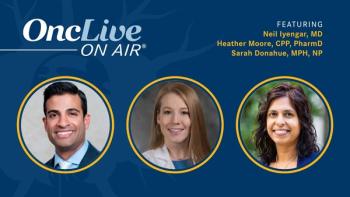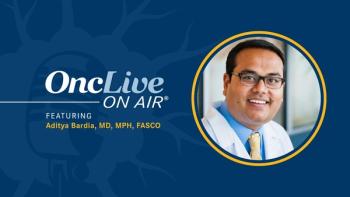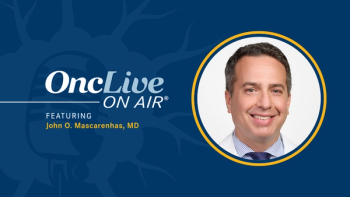
Tripathy on Treating HER2+ Breast Cancer With Leptomeningeal Metastasis

Dr Tripathy explains the rationale for the TBCRC049 trial, the challenges of investigating a disease that appears in less than 5% of patients with breast cancer, and potential avenues for future investigations.
Welcome to OncLive On Air®! I’m your host today, Caroline Seymour.
OncLive On Air® is a podcast from OncLive®, which provides oncology professionals with the resources and information they need to provide the best patient care. In both digital and print formats, OncLive® covers every angle of oncology practice, from new technology to treatment advances to important regulatory decisions.
In today’s episode, we had the pleasure of speaking with Debu Tripathy, MD, professor and chairman in the Department of Breast Medical Oncology and Division of Cancer Medicine at The University of Texas MD Anderson Cancer Center, to discuss ongoing research in patients with leptomeningeal disease and HER2-positive breast cancer.
Dr Tripathy is a coauthor on the phase 2 TBCRC049 trial (NCT03501979), which is evaluating the combination of tucatinib (Tukysa), trastuzumab (Herceptin), and capecitabine (Xeloda) for the treatment of leptomeningeal disease, or LMD, in patients with HER2-positive breast cancer.
At a median follow-up of 18.0 months, the median overall survival (OS) was 10.0 months and the median time to central nervous system progression was 6.9 months (95% CI, 2.3-13.8) for the 17 patients who received the triplet regimen.
LMD is a rare complication associated with some advanced solid tumors, including breast cancer, that occurs when tumor cells spread to the leptomeninges, thin layers of tissue that cover the brain and spinal cord. Symptoms can include seizures, double vision, and weakness or lack of coordination in the limbs. Traditionally, the median OS for patients with LMD is less than 6 months.
During our exclusive interview, Dr Tripathy explained the rationale for TBCRC049, the challenges of investigating a disease that appears in less than 5% of patients with breast cancer, and potential avenues for future investigations.
Check back on Thursdays for exclusive interviews with leading experts in the oncology field.
For more updates in oncology, be sure to visit www.OncLive.com and sign up for our e-newsletters.
OncLive® is also on social media. On Twitter, follow us at @OncLive and @OncLiveSOSS. On Facebook, like us at OncLive and OncLive State of the Science Summit and follow our OncLive page on LinkedIn.
If you liked today’s episode of OncLive On Air®, please consider subscribing to our podcast on Apple Podcasts, Spotify, Google Podcasts, Amazon Music, and many of your other favorite podcast platforms,* so you get a notification every time a new episode is posted. While you are there, please take a moment to rate us!
Thanks again for listening to OncLive On Air®.
*OncLive On Air® is available on: Apple Podcasts, Google Podcasts, Spotify, Amazon Music, Audacy, CastBox, Deezer, iHeart, JioSaavn, Listen Notes, Player FM, Podcast Addict, Podchaser, RadioPublic, and TuneIn.



































